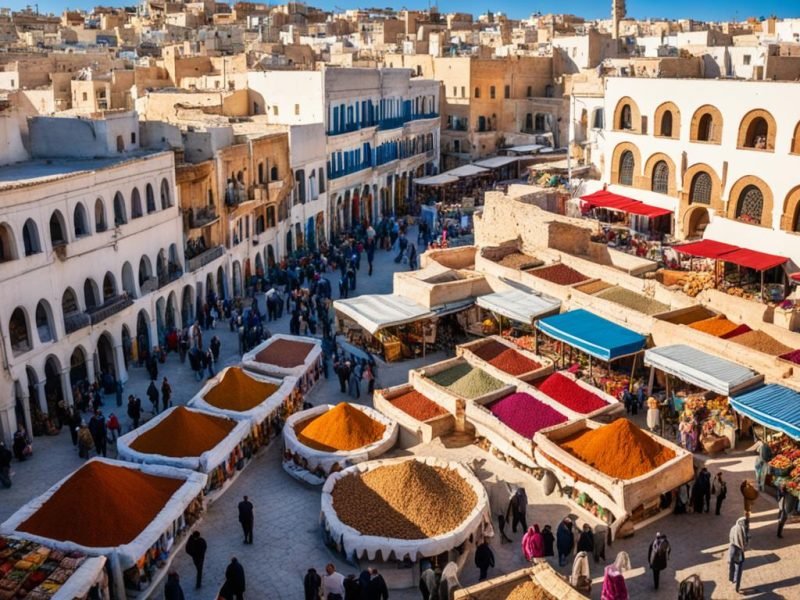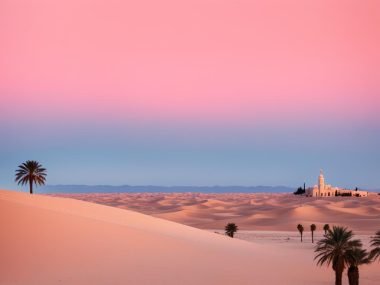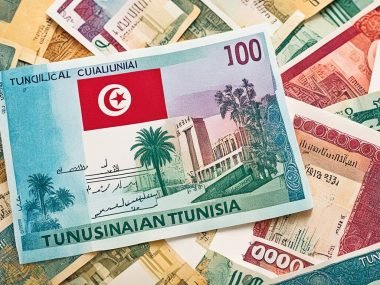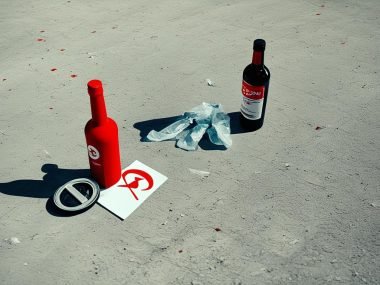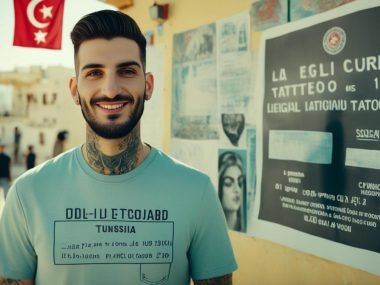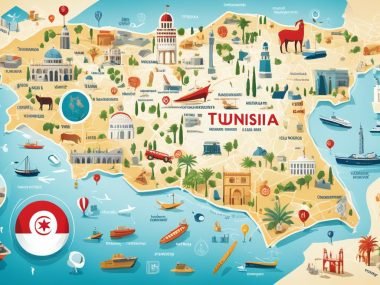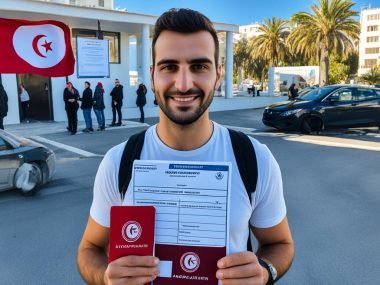Tunisia is 56th in the world for quality of life. This is according to the 2021 Numbeo Quality of Life Index. It mixes Mediterranean and Arab cultures beautifully. With ancient Carthage and lovely beaches, Tunisia is hard to ignore. It offers history, culture, and beauty.
I have seen Tunisia’s lifestyle myself. It mixes old traditions and modern comforts well. In cities like Sousse or the Sahara Desert, there’s always something new. Living in Tunisia means a relaxed but lively life, rooted in history by the sea.
Key Takeaways
- Tunisia ranks 56th globally for quality of life.
- The nation’s culture is a blend of Mediterranean and Arab influences.
- Living in Tunisia offers a mix of modern amenities and historical charm.
- From beaches to deserts, Tunisia boasts diverse scenic beauty.
- Exploring local souks can be an everyday adventure.
An Overview of Tunisia’s Culture and Lifestyle
Tunisia offers a vibrant mix of cultures. It has a rich culture and lively neighbourhoods. These give a deep look into its heart and soul.
The Influence of Mediterranean and Arab Cultures
Tunisian culture is a wonderful mix of the Mediterranean and Arab worlds. Its food shows a great balance of both. From Arab spices to Mediterranean olive oil, each dish tells a heritage story. Tunisia’s buildings show this mix too. They have both peaceful Mediterranean vibes and Arab details.
Everyday Life in Tunisian Neighbourhoods
Life in Tunisian neighbourhoods is full of traditions and community. Morning walks in local markets are lively. You can hear sellers and see people chatting. Coffee shops and tea houses are where people meet. They mix old customs with new ways nicely.
Courtyards are where neighbours meet, share stories, and do activities together. These moments keep Arab traditions alive. They also show how the Mediterranean style helps make a close community.
The Cost of Living in Tunisia: Affordable or Expensive?
Many expats find living in Tunisia cheaper than their home countries. This is true especially when compared to the UK. To understand Tunisia’s affordability, we must look at all expenses.
Comparing Costs with the UK
In comparing costs, several expenses stand out. For example, rent and bills are cheaper in Tunisia. But, tech and imported items may cost as much as in Europe. Here is a more detailed look:
| Expense | Tunisia | UK |
|---|---|---|
| Rent (1-bedroom apartment) | £200 | £750 |
| Utilities (monthly) | £35 | £150 |
| Internet | £15 | £30 |
| Groceries (basic) | £100 | £200 |
Living in Tunisia can be cheaper, especially for those from pricier areas like the UK. Yet, it’s good to check the cost of imports and luxury items closely.
Affordable Local Markets
Local markets make Tunisia living affordable. You can buy fresh food and daily stuff much cheaper than in the UK. Exploring these markets offers fun and a peek at local life. This shows how living costs in Tunisia differ from the UK.
Accommodation Options in Tunisia
Expats and locals in Tunisia weigh up renting against buying. Each option caters to different needs in this diverse country.
Renting vs Buying Property
Renting offers great flexibility with a lower upfront cost. You can choose from city apartments to quiet homes. Buying is good for those wanting to settle long-term. It’s cheaper than many places, attracting investors and residents.
Types of Housing Available
Housing in Tunisia varies widely. Cities have modern apartments. Suburbs feature large family homes. Rural areas offer traditional Tunisian homes with courtyards. There’s something for everyone’s taste and budget.
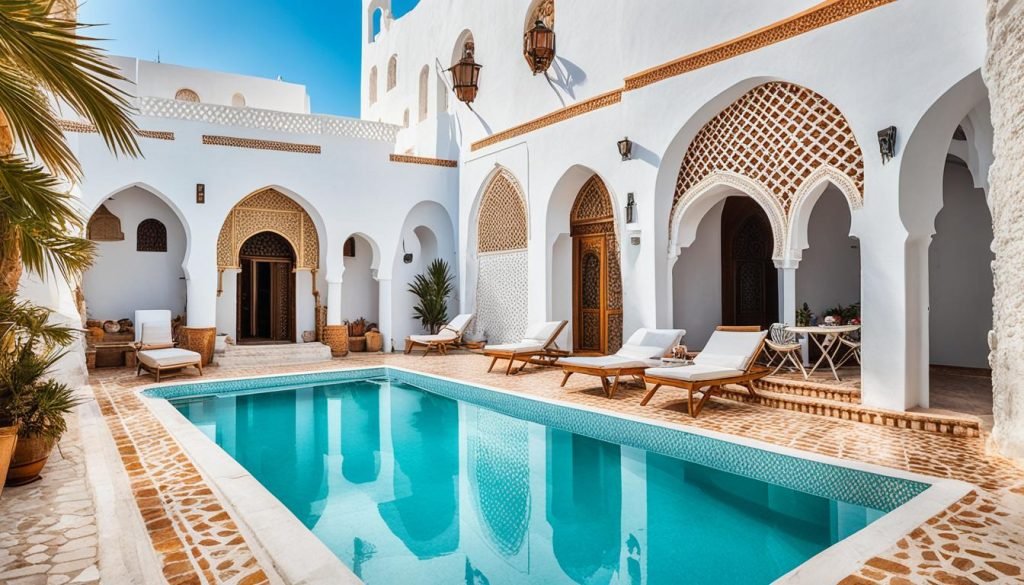
| Criteria | Renting in Tunisia | Buying Property in Tunisia |
|---|---|---|
| Flexibility | High | Low |
| Initial Cost | Low | High |
| Commitment | Short-Term | Long-Term |
| Investment | No | Yes |
| Flexibility to Move | Easy | Difficult |
What Is It Like To Live In Tunisia as an Expat?
Living in Tunisia means facing both tough and lovely experiences. Settling in a new country can be exciting and scary. I got to know a place full of traditions and friendly people.
Challenges Faced by Expats
Expats in Tunisia have to overcome many obstacles. Not knowing Arabic or French can be hard. Also, getting used to local ways and finding a job takes effort. But, every day is a chance to learn something new.
The Expat Community in Tunisia
The expat community in Tunisia is very helpful for newcomers. Joining these groups offers great support and friendship. It makes moving to a new country less scary and helps you fit in more quickly.
Transport and Mobility in Tunisia
Transport in Tunisia has many choices. It lets you move through its lively cities and calm landscapes. For locals and visitors, it’s a great way to see Tunisia’s daily life. The public transport, like buses and metros, is key for getting around cities.
Public Transport Systems
Tunisia’s public transports connect big cities and towns well. Buses, run by Transtu, are popular for their reach and good prices. The metro in Tunis is fast, making it easy to move in the busy capital. With these, getting to most places in Tunisia is easy.
Taxis, Buses, and Louages
There’s more than just buses and metros. Taxis, buses, and louages (shared taxis) are also important. Taxis are easy to find and good for flexible trips. Buses help with longer trips, in both cities and rural areas. Louages are special. They’re quick and not too costly, good for city-to-city travel.
| Mode of Transport | Cost | Accessibility | Convenience |
|---|---|---|---|
| Buses (Public) | Low | High | Moderate |
| Metro | Low | High (in Tunis) | High |
| Taxis | Moderate to High | High | High |
| Louages (Shared Taxis) | Low | Moderate | High |
Healthcare Services in Tunisia
Tunisia has healthcare for everyone. It’s run by both the government and private companies. The government helps make sure public healthcare is there for locals and foreigners who work there. But, there’s a big difference between public and private healthcare quality.

Public vs Private Healthcare
The government pays for public healthcare, so it’s free for residents. But, it’s not always the best quality and can be very busy. Private healthcare is nicer and many foreigners use it. It has more languages spoken, which is good for patients.
Accessing Medical Facilities
Getting to a doctor in Tunisia is easy. You can use public hospitals and clinics without paying a lot. But private doctors give better and faster care. They meet world standards. If you’re from another country, it’s a good idea to have health insurance.
In Tunisia, there are many choices for healthcare. Everyone can find something that works for them. The public and private places both help keep the country healthy.
Leisure and Recreation in Tunisia
Imagine a break from the busy world to enjoy both exciting and peaceful times. Tunisia has so much to do. You can tan on beautiful beaches or explore large deserts. The country’s many events and festivals let you see local culture up close.
Beaches, Mountains and Desert Adventures
Tunisia’s long coastline is perfect for lovers of sun and sea. Beaches like Hammamet are popular, while Djerba is more peaceful. There’s a beach for everyone. Inland, mountains offer beautiful hikes. They are great for those who love stunning views and quiet spots.
Looking for excitement? Try desert adventures. The Sahara Desert offers fun like dune bashing, camel rides, and camping under stars. These show Tunisia’s unique fun activities.
Local Festivals and Events
Tunisian festivals bring culture to life. They show off the nation’s traditions, food, music, and crafts. The Carthage International Festival mixes art and history with performances from around the world.
The Sahara Festival in Douz celebrates desert life and culture. It helps visitors understand Tunisia’s vibrant lifestyle.
In the end, whether you’re on Tunisia’s beaches, in the mountains, or having desert thrills, there’s something for everyone. Tunisia’s leisure activities are diverse and exciting.
Language and Communication
The Tunisia language scene is fascinating. It mixes Arabic and French communication ways. Arabic is the main language used every day. But, French is important in work and school. This mix makes the culture rich. It also shows the history and current life in Tunisia.
The Role of Arabic and French
Arabic is key to Tunisia’s identity. Standard Arabic is for official use. Darija, or Tunisian Arabic, is for daily talk. French is used a lot in jobs. This is because of Tunisia’s history and its links with the world today. There are signs in both languages. This makes Arabic and French communication smooth.
Tips for English Speakers
English speakers in Tunisia might find it hard. This is because people mainly speak Arabic and French. But, more young people are learning English now. This helps.
- Learn basic Arabic and French words for everyday use.
- Use translation apps for help.
- Join local or language groups to learn more.
Conclusion
Tunisia is an exciting place to live. It mixes culture and daily life in a special way. You will find it cheaper than the UK. The markets are full of fresh food and cool things. These show the country’s mix of cultures.
Looking for a house here? There are many choices for renting or buying. The transport is good and makes travelling easy. You can use buses, taxis, or louages.
Health care in Tunisia is easy to get to and good. There are lots of things to do for fun. You can visit beautiful beaches or go on desert adventures. Speaking Arabic, French, or some English helps a lot.
Living in Tunisia is better because of the expat community. They help make moving here easier. They enjoy sharing their stories and joining local events. Tunisia is a great place with lots to offer.
Source Links
- https://www.expat.com/forum/viewtopic.php?id=247133 – What is living in Tunisia REALLY like? – Tunis forum – Expat.com
- https://wildyness.com/news/expats-in-tunisia – The Ultimate Expat Guide to Moving to Tunisia
- https://www.reddit.com/r/Tunisia/comments/1b2q4vc/living_in_tunisia/ – Reddit – Dive into anything

